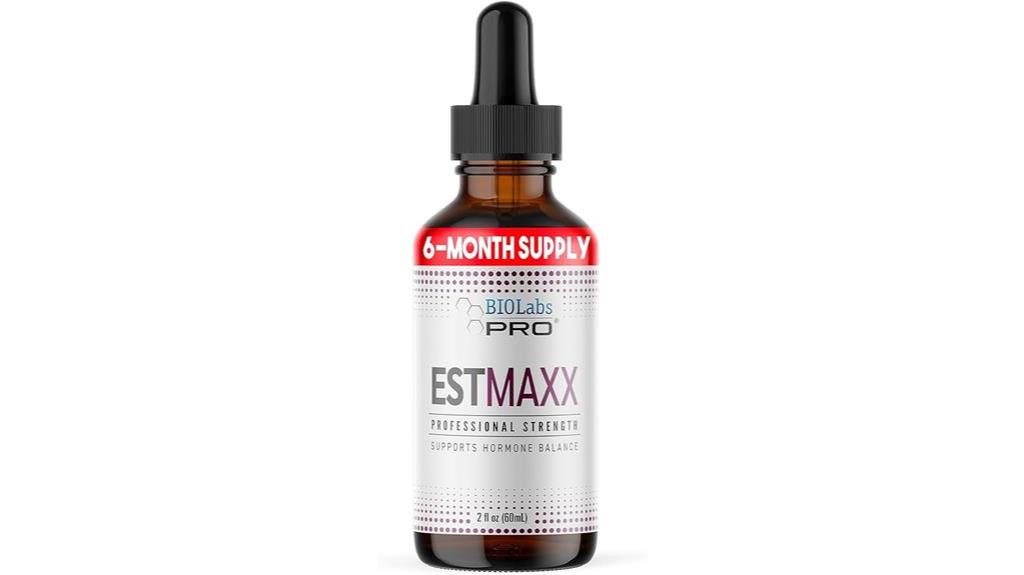I've recently come across an intriguing supplement that's been gaining attention in the hormone health community: BIOLabs PRO Est MAXX Oil. What caught my eye is its use of plant-based estriol, a less common form of estrogen that's touted for its gentler effects. As someone who's always on the lookout for natural alternatives to synthetic hormones, I'm interested in its potential benefits for skin health and hormonal balance. While the product seems promising, I can't help but wonder about its long-term efficacy and safety profile. There's more to uncover about this estriol supplement, and I'm keen to share my findings.
Natural Estrogen Supplement Review
I've analyzed BIOLabs PRO Est MAXX Oil, a plant-based estriol supplement marketed as a natural alternative to traditional hormone replacement therapy for menopausal symptoms and skin rejuvenation. The product contains estriol, a weak form of estrogen, along with MCT oil and vitamin E. It's free from artificial preservatives, parabens, and sulfates, adhering to clean formulation standards.
The oil's versatility allows for sublingual, oral, or topical application, with users reporting positive effects on skin texture and wrinkle reduction. Its estriol content may offer benefits similar to prescription creams, but with the convenience of over-the-counter access. However, effectiveness for menopausal symptoms varies among users, with some reporting no significant improvements.
While BIOLabs PRO Est MAXX Oil presents an appealing option for those seeking natural hormone replacement, it's important to consult a physician before use, especially given the complexities of hormonal balance and individual needs.
Plant-Based Estriol Formula
It's important to note that BIOLabs PRO Est MAXX Oil's plant-based estriol formula differentiates it from synthetic hormone replacement options. The key lies in its natural composition and versatile application methods. This product utilizes estriol, a weak form of estrogen, derived from plant sources. It's formulated without artificial preservatives, parabens, or sulfates, offering a cleaner alternative to traditional hormone therapies.
The oil's plant-based estriol may contribute to skin rejuvenation and hormonal balance, particularly for peri-menopausal women. Its topical application has shown promise in reducing wrinkles and improving skin quality. The sublingual or drink-mixing options provide flexibility in administration, potentially enhancing absorption.
While user experiences vary, the natural formula and precise dosing capabilities set it apart from synthetic options. However, it's important to note that effectiveness can differ among individuals, and consultation with a healthcare provider is essential before incorporating any hormone supplement into one's regimen.
Safety and Effectiveness Considerations
While plant-based formulas offer potential benefits, it's important to examine the safety profile and efficacy of BIOLabs PRO Est MAXX Oil.
As a user exploring alternatives to traditional hormone replacement therapy, I've considered the following points:
- Estriol's weak estrogenic effects may contribute to hormone balance without excessive risks
- Topical application has shown promise for skin benefits, particularly in wrinkle reduction
- The product's natural ingredients and absence of synthetic additives may reduce adverse reactions
However, I'm aware that individual responses can vary. The mixed user feedback highlights the significance of personalized dosing and monitoring.
While some users report positive outcomes for menopausal symptoms and skin rejuvenation, others experienced no noticeable effects or unwanted weight gain. It's important to consult a physician before use, especially when dealing with hormone-related products.
The 60-day results guarantee provides a safety net for those willing to try this estriol-based solution.
Cost-Benefit Analysis
A cost-benefit analysis of BIOLabs PRO Est MAXX Oil highlights several factors to take into account when evaluating its value proposition. The financial investment for a 2oz bottle, providing a six-month supply, must be weighed against potential benefits for menopausal symptoms and skin rejuvenation.
I've found that the convenience of sublingual or topical application, combined with natural ingredients and cruelty-free manufacturing, adds to its value. However, the mixed user feedback on effectiveness raises questions about consistent results.
The 60-day guarantee mitigates some financial risk, allowing users to test the product's efficacy. When comparing to prescription alternatives, I've noted that BIOLabs PRO Est MAXX Oil may offer a more accessible option for those seeking estrogen supplementation.
Ultimately, the cost-benefit ratio will vary based on individual responses and the importance placed on natural, plant-based solutions.
Regulatory Oversight Recommendations
Given the nature of BIOLabs PRO Est MAXX Oil as a hormone-containing supplement, I'll address the need for appropriate regulatory oversight to guarantee consumer safety and product efficacy.
The presence of estriol, a weak form of estrogen, necessitates stricter hormone regulation to guarantee proper dosage and prevent potential adverse effects. I recommend implementing standardized dosage guidelines based on scientific research and clinical trials. These guidelines should account for individual variations in hormone levels and menopausal symptoms.
Additionally, regulatory bodies should require manufacturers to provide detailed information on hormone content and potential interactions with other medications. Mandatory third-party testing and verification of ingredient purity and potency should be enforced.
Conclusion
I've analyzed BIOLabs PRO Est MAXX Oil's potential as a natural estrogen supplement. While its plant-based estriol formula offers a promising alternative to synthetic hormones, I'm cognizant of the varying individual responses.
The product's safety profile appears favorable, yet I'd recommend stronger regulatory oversight. Weighing the cost-benefit ratio, I find it's a viable option for hormone support, though not without caveats.
Ultimately, it's a complex interplay of benefits and limitations.
